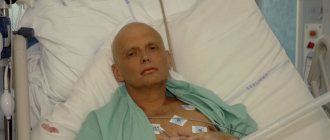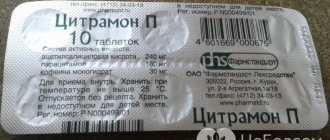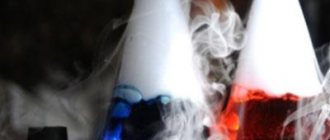Nausea, fever and chills are pathological signs indicating disruptions in the body's main vital systems. Discomfort in the epigastrium, combined with an increase in temperature and a feeling of coldness in the body, are common complaints of patients suffering from infectious (viral) diseases. Chills occur after cooling the body/emotional outbursts and are a consequence of spasm of blood vessels localized on the surface of the skin. Fever, nausea and a feeling of cold are components of the defense mechanism.
Types of poisoning
In the medical field, there are several types of poisoning that occur with similar symptoms:
- Food. It occurs when eating low-quality foods contaminated with bacteria.
- Chemical. Appears from acids and alkalis. This type of poisoning can occur when detergents and cleaning products are ingested.
- Pesticide intoxication. This phenomenon is observed when poisons used in the national economy in the fight against insects and rodents are mishandled.
- Vegetation poisoning. Occurs due to the consumption of poisonous berries, mushrooms, and plants.
- Drug intoxication. Appears from the use of medications in large quantities.
- Carbon dioxide poisoning. The phenomenon occurs during a fire, malfunctioning stoves and in garages where there is no proper ventilation.
In case of poisoning, chills, diarrhea and fever are the main symptoms. But there are also dangerous signs that require immediate intervention from medical personnel.
Actions at temperatures of 38.5 and above
In case of poisoning, it is imperative to lower the temperature if the readings on the thermometer exceed 38.5 degrees. For such purposes, it would be rational to carry out the following procedures:
- vinegar wrap;
- using cold compresses on the forehead;
- wiping the skin with water, water or vinegar solution;
- drinking plenty of water;
- taking antipyretic drugs;
- use of folk recipes.
Important! If you have a severe fever with an increase in body heat above 38.5-39, you should definitely seek help from a medical facility.
Many medications can irritate the gastric mucosa and worsen the condition of the poisoned person. If the patient develops gastritis or pancreatitis, analgesics are contraindicated for him!
The following antipyretic drugs are considered less aggressive and safer:
- suppositories with Ibuprofen or Paracetamol;
- Nimesulide;
- Nise;
- Nimesil;
- Paracetamol;
- Ibuprofen;
- Nurofen.
If an adult’s fever cannot be brought down with such drugs, doctors administer a mixture of Analgin and Diphenhydramine.
What is food poisoning?
How does poisoning occur? Contaminated food, which contains pathogenic bacteria and the toxins they produce, is eaten by a person. Death occurs in the stomach due to the action of hydrochloric acid, but it is not capable of neutralizing toxins. As a result, harmful components are absorbed into the blood and symptoms appear.
Depending on the aggressiveness of these substances and their concentration, the amount of time before the onset of the disease may vary. Sometimes a poorly eaten product reminds itself after 30 minutes, and in other cases, symptoms appear only after 12 hours.
In intestinal infections, bacteria not only survive, but remain there. They are able to live and multiply in the intestinal mucosa, sometimes entering the regional lymph nodes. The disease can have a long incubation period, and antibiotics are always needed, otherwise it is difficult to eliminate the infection.
Traditional recipes to combat fever and fever
- dill decoction with honey . Take 1 teaspoon of dill (fresh or dry) and pour a glass of boiling water. Simmer for 15-20 minutes on low heat. Add half a glass of boiling water and 1 dessert spoon of honey to the finished broth. Drink half a glass of this herbal infusion half an hour before meals;
- ginger tea . To prepare tea you need 1 dessert spoon of ground ginger. Add a glass of boiling water to this mixture and infuse the drink for 20 minutes. Drink 1 dessert spoon of the finished tea every 25-35 minutes. To improve the taste of the drink, you can add a small amount of sugar or honey;
- enema based on tincture of chamomile flowers. The tincture is prepared from 4 chamomile flowers (pharmaceutical) and 1 liter of boiling water. This mixture is heated in a water bath for 10-15 minutes and allowed to cool. The finished decoction can be used for an enema.
Symptoms
Symptoms during poisoning vary, it all depends on the component that caused the poisoning and on the immune system. Signs of intoxication appear within a few minutes when consuming chemicals, but they can also appear half a day later with food poisoning. Likely to appear:
- nausea;
- vomiting;
- neurological changes - seizures, hallucinations;
- pain in the abdomen, stomach, esophagus;
- diarrhea;
- general loss of performance;
- weakness in the limbs and chills;
- elevated temperature;
- migraine;
- cyanosis of the skin and mucous membranes.
If you experience chills, fever, or feeling unwell during poisoning, it is advisable to call an ambulance for advice on what to do before doctors arrive. This will improve the condition.
Chills, nausea, weakness: causes, what diseases have such symptoms
Weakness, nausea, sometimes vomiting, chills without or with fever are a set of symptoms that indicate the presence of the disease. Many diseases fit the listed symptoms. It will not be possible to say definitively without additional examination. It's definitely time to pay attention to your health. Manifestations reduce performance and interfere with normal life activities.
To treat symptoms, traditional methods and medications are used. Those who suffer from the listed manifestations experience additional unpleasant signs of illness: dizziness, diarrhea, headache, increased intracranial pressure, low or high blood pressure. Unpleasant symptoms can occur in adults and children.
Causes of symptoms
The source of unpleasant symptoms can be internal and external factors.
Internal include:
- A brain tumor.
- Poisoning of the body.
- A disease associated with infection.
- Blood pressure surges.
- Disturbances in the functioning of the vascular system of the brain.
To external:
- Frequent lack of sleep.
- Stressful situations.
- Chronic fatigue.
Possible diseases
Before treatment, an accurate diagnosis must be made. The severity of the disease depends on the number of unpleasant symptoms and their intensity. But, despite the fact that the diagnosis must be made by a specialist, every person can learn to understand their condition and provide self-help.
- Nausea and vomiting are often signs of food intoxication. Poisoning is characterized by fever, heaviness in the stomach and abdominal pain, weakness and chills. You can get rid of the listed symptoms at home, if we are not talking about poisoning with chemicals. It is worth self-medicating only when the patient is absolutely sure that poisoning has occurred. Diarrhea is another sign of intoxication. If there is no symptom, then we are talking about an allergic reaction, heat stroke, sunstroke.
- Symptoms may appear during ARVI. Chills with weakness and nausea are the initial signs. The human body aches, freezes and shakes, feels dizzy and hurts. In children, ARVI can occur in different ways. To the listed features is added a lack of appetite, diarrhea, and heavy breathing. Almost all diseases of the infectious spectrum cannot occur without elevated temperature. High fever, fever, headache, accompanied by dizziness and vomiting may occur.
- VSV (vegetative-vascular dystonia) is a common diagnosis, manifested by weakness, sweating, headache, and dizziness. VSD sufferers often complain of too low or high blood pressure. VSD is not considered a disease - a set of symptoms. More often, the basis of symptoms is four components: problems with the cardio-system, vascular and neuralgic diseases, problems of a psychological nature.
- A panic attack is a psychological disorder that often affects young people. The following signs are typical for an attack: weakness, lump in the throat, fever, shortness of breath, dizziness, the person is chilling and nauseous. There is an added feeling of fear and anxiety.
Only common diseases are described here. To find out an accurate diagnosis, you should contact your doctor, who will diagnose and prescribe treatment.
What to do
Eliminate symptoms through an integrated approach, including treatment with medications, traditional methods and dietary changes.
Conservative treatment
The prescription of medications depends on the diagnosis. Diagnosis is carried out through a doctor.
In case of food poisoning, activated carbon and rehydron are prescribed. The first remedy is taken after vomiting, when the stomach is washed and the symptoms of poisoning have subsided.
Activated charcoal is taken when a person has loose stools. Regidron is also prescribed for poisoning to restore the body's water balance.
After consuming the drug, the patient will no longer feel nausea and the urge to vomit will subside.
Paracetamol is prescribed for infectious diseases. This drug helps when there is a high temperature, which may be accompanied by fever with chills. Paracetamol should not be used by pregnant women, alcohol abusers, or those with liver and kidney diseases.
Diprazine is prescribed as a drug that calms the human nervous system and enhances the effect of painkillers. It has contraindications similar to the previous drug.
“Star” is a balm used for respiratory diseases, headaches, and chills. Helps eliminate nausea and normalize blood flow.
For hypotension, take askofen, citramon and other drugs containing caffeine - it helps to increase blood pressure.
Traditional methods
A simple way to get rid of nausea and chills is to drink tea with lemon or raspberries. The method will improve your well-being, depending on the cause of the symptoms. More often, this method is used when overwork or nervous tension occurs.
If chills, nausea and weakness are caused by a stressful situation, tea made from lemon balm, mint, chamomile or sage will help. For nausea, chew cardamom grains, you can drink lemon water with honey, or a drink with ginger.
To lower the temperature and eliminate chills with weakness, consume citrus fruits. Compresses are considered an effective remedy that lowers temperature and reduces pain. Apply an absorbent cloth soaked in a solution of water and vinegar to your forehead.
A normal pressure is considered to be 120 over 80 or 110 over 90. Exceeding the range indicates high blood pressure, and low blood pressure means low blood pressure. Weakness and chills are signs of low blood pressure.
For low blood pressure and weakness, drink black coffee, black strong tea, cocoa, and take a contrast shower.
For intracranial pressure, a sign of which is headache and weakness, you should drink tincture of hawthorn, eucalyptus, and valerian.
Nutrition
In addition to pills and traditional methods of treatment, you should pay attention to nutrition. Often, it is poor nutrition that causes unpleasant symptoms such as nausea and weakness. Any medication eliminates only the symptoms, but in order to completely get rid of the cause of the disease, you need to radically change your lifestyle and diet.
The first thing you should avoid is fried, fatty foods. Causes nausea after eating. Heavily carbonated, alcoholic, and energy drinks negatively affect the general condition of the stomach. Abuse of sweets, spicy foods, pickled and salted foods should be avoided.
It is worth giving preference to porridges cooked in water, milk, dairy products, vegetable soups, and low-fat meat broth. Drink freshly squeezed juices, eat fresh fruits.
The described diet is suitable after ARVI, when the stomach hurts, and for other diseases. The diet is preventative.
Prevention
To prevent weakness, chills, and nausea from recurring, follow the following preventive measures:
- Take days off (change your environment periodically, don’t get overtired).
- Take a contrast shower.
- Monitor your diet (follow the diet rules).
- Give up harmful habits (smoking, alcoholic drinks, drugs).
- Take time to walk outside.
- Periodically clean your home to prevent infectious diseases.
- Don't neglect your own hygiene.
- Monitor your health and undergo periodic examinations in the hospital.
- Exercise.
Practice, including a proper diet, traditional methods, and medications, will help solve the problem, get rid of unpleasant, disturbing symptoms, and return to the previous state.
Source: https://GastroTract.ru/simptom/toshnit/oznob-toshnota-slabost.html
Common reasons
What are the causes of chills during poisoning? This phenomenon appears from a spasm of blood vessels, of which there are many in human skin. The patient feels trembling and spasms in the muscles, coldness, and “goose bumps” occur. A common cause of this condition is fever - a high temperature observed during injuries and infectious diseases.
Chills during poisoning appear due to nervousness due to chronic stress, fatigue or depression. The occurrence of various diseases at an early stage should not be excluded. Chills are often manifested by:
- hypertension, which can lead to hypertensive crisis or stroke;
- malaria is a dangerous disease that occurs among travelers;
- hormonal changes;
- diabetes;
- intoxication, poisoning with fever.
It is advisable not to self-medicate for these ailments, as this can be dangerous. It is better to follow the recommendations of specialists.
Why does it appear?
Chills during poisoning indicate food intoxication. This is considered a consequence of increased temperature and dehydration. Chills from food poisoning are natural. When pathogenic microorganisms enter the body, intoxication and inflammation are formed, which the immune system will fight against.
All organisms react to poisoning in different ways. This may manifest itself in the form of fever, chills, weakness, and dizziness. This phenomenon should be considered only together with other symptoms.
Vomiting occurs with poisoning and chills. If there is a strong fever, then you need to normalize the temperature with medications. Antipyretics are used in the form of tablets and injections. In cases of severe intoxication, it is undesirable to use syrups and powders. These products contain dyes, preservatives, and flavorings that irritate the stomach.
How to reduce chills at home
If you feel chilly due to food poisoning, you should immediately measure your body temperature. It contributes to the appearance of an unpleasant symptom. To eliminate tremors, a comprehensive approach to treatment is required. You can try to relieve the chills and cure the poisoning at home.
The main principle is that if your general condition becomes aggravated (the appearance of severe weakness, incessant vomiting, unbearable pain in the stomach), immediately call an ambulance to continue therapy in the hospital.
You can try to drink away mild to moderate poisoning at home. It is important to remove intoxication, after which the unpleasant symptoms will disappear. The main measures for treating the pathological condition are:
- At the initial stages, doctors recommend trying to cleanse your body of toxins. Drink plenty of water and induce a gag reflex. Instead of water, a weak solution of potassium permanganate will do. It disinfects the gastrointestinal tract and removes toxins. Drink the solution and induce vomiting.
- A cleansing enema is suitable as an additional means of cleansing. If the patient has prolonged diarrhea, then there is no point in it. It is allowed to use the drug Microlax. It is available in the form of a microenema containing 5 ml of the substance. The medicine removes remaining toxins and disinfects the intestines.
- You should not abuse artificial vomiting and enemas. It is better to use an enhanced drinking regime to combat the disease. It is advisable to drink half a glass of warm water every 15 minutes, even if you don’t feel like it. Unsweetened green tea and dried fruit compote are suitable. Experts recommend adding salt to water to replenish lost reserves of fluid, salt, and electrolytes. Drinking regimen is the most important treatment tactic. It relieves intoxication, prevents the occurrence of hypovolemic shock, and promotes the elimination of toxins.
- Enterosorbents adsorb harmful substances and carry out internal detoxification. For ease of use, most of them are available in powder form, which are mixed with water and drunk throughout the day. Popular and common drugs include: Smecta, Regidron, Enterosgel, Polysorb. Activated carbon is taken 1 tablet per 10 kg of body weight. This medication should be used as a first aid drug for intoxications of various origins.
Having carried out emergency measures, you can begin symptomatic treatment. The patient is shivering due to general intoxication; it is necessary to act on it. If the temperature is normal, but the patient is shivering, you need to start with physical warming methods:
- Place a heating pad on your legs and arms. You can fill plastic bottles with hot water and apply it to the victim.
- Give plenty of warm water to drink.
- Cover the patient with blankets.
- To dilate blood vessels, it is recommended to give a No-Spa tablet, for children - half a tablet.
Further treatment tactics depend on the numbers on the thermometer. If the device readings are low, it is enough to take liquid and sorbents. In case of severe fever, antipyretic drugs come to the rescue. Aspirin, analgin, paracetamol, ibuprofen, mefenamic acid - this is an incomplete list of temperature savers.
The main rule is to use as prescribed by a doctor. Children are allowed only Paracetamol and Ibuprofen. The rest are rarely used in pediatric practice so as not to cause side effects. Antipyretic medications are available in tablets, syrups, capsules, drops, and suppositories. Everyone will find a drug suitable for them. You should not abuse medications; it is better to direct all your efforts to combat dehydration.
Severe cases require immediate action. Incessant vomiting, severe chills, and the development of hypovolemia require hospital treatment. Trembling and other signs of poisoning are relieved with the help of intravenous drips (use saline, glucose, Ringer's solution), antibiotics, antiemetics (osetron, metoclopramide), and if indicated, resort to hemodialysis and plasmapheresis.
How long does the condition last?
The duration of chills is determined by the etiology of the causative agent of the disease. The higher the pathogenicity of the microorganism, the longer the negative symptoms persist. There will be trembling in the human body until the body eliminates the foreign agent.
Getting rid of chills is associated with treating fever and hypovolemia. When symptomatic therapy begins to act, then the signs of intoxication disappear.
Improper treatment only worsens the condition. Dehydration progresses, hypovolemic shock appears with consequences. Chills are eliminated by antipyretics and the use of warming methods. The condition improves with rehydration therapy.
How to cope
If chills appear for the first time and nothing else bothers you, there is no need to panic. “Here it will be enough to drink warm, not hot tea, maybe with lemon and go to bed. You can also use a heating pad to keep warm. If symptoms progress, you should consult a doctor. If any changes occur suddenly, for example, blood pressure drops or rises sharply, or other disturbing symptoms appear, you should call an ambulance,” says the immunologist.
If spasms occur not for the first time, i.e. Some vascular manifestations have already occurred, for example, with VSD, and the person knows about them, then you can take a drug to relax the blood vessels, notes the immunologist. The situation should improve. “But if the chills do not go away within 24 hours and worsen, and parallel symptoms intensify and other secondary manifestations appear, you should visit a specialist as soon as possible,” says Anna Shulyaeva.
Surely every person has encountered people in their life who are constantly freezing. Even in the summer, when everyone around is trying to bare as much as possible so that it is not so hot, these men and women can wrap themselves up in woolen sweaters and wear thick trousers. Constant chills without fever is a feature that is most often inherent in girls and women of asthenic physique. However, sometimes strong representatives of the stronger sex, who at first glance are simply bursting with health, also suffer from chills.
Why does this happen? First of all, it should be noted that chills and weakness in themselves are not a disease - they are nothing more than symptoms. They may indicate that the patient has an endocrine or infectious disease, as well as a benign or malignant neoplasm in the body. In addition, chills often bother those people in whom an inflammatory process develops in the body, which is accompanied by suppuration.
Help
There is no need to carry out special treatment for chills in case of poisoning, but it is necessary to alleviate the person’s condition. If a feeling of cold appears, the patient is placed comfortably and covered. When chills appear due to poisoning, what should you do? First aid is performed as follows:
- Hands and feet should be covered with heating pads filled with warm water. The patient should be monitored as seizures may occur.
- It is necessary to ensure peace and comfort.
- It is necessary to give antispasmodics to relieve vasospasm.
With vasospasm and trembling, it is difficult to bring down the temperature. A No-shpa tablet is given with an antipyretic, which relieves spasms and eases chills, but this can only be done after consulting a doctor.
Diagnosis and treatment
The doctor will be able to make the correct diagnosis after collecting anamnesis, examining the patient and receiving test results. If necessary, additional examination and consultation with highly specialized specialists will be prescribed.
Nausea, vomiting, headache require the following treatment:
- for hypertension - take medications prescribed by a doctor to normalize blood pressure;
- in case of emotional tension, stress - try to calm down, take a sedative, drink tea with mint, lemon balm or sage;
- If you have a cold, drink hot tea with raspberries and wrap yourself in a blanket. If there is no fever, you can take a hot foot bath;
- for menopause and menstruation - drink warm herbal tea;
- in case of hypothermia - a hot hour with honey, warm clothes.
What to do if an adult has constant chills? Your doctor will answer this question after receiving the examination results. Since there can be many reasons, treatment tactics are different in each case.
If you have health problems, undergo a complete examination of your body in our clinic, followed by consultation with a specialist. The doctor will tell you why cold chills appear at night and answer your questions. Call the above phone number or fill out an application on the website. We are always ready to help.
First aid
If the poisoning is without fever, then it will be easier to improve the condition. Emergency care for various intoxications is as follows:
- Gastric lavage is necessary. This procedure is performed at home only in case of food poisoning (medicinal or herbal). In other cases, it is necessary to use a special probe with a large diameter so as not to worsen the situation.
- Colon lavage is performed with slightly salty or acidic water.
- The patient is given a large amount of fluid. Still mineral water, weak compotes, jelly, raisin or dried apricot decoction can be used. In case of poisoning with chills, these drinks are doubly useful.
- The patient is provided with probiotics that quickly restore the intestinal microflora. The liquid is given in doses, 1 tbsp. l. every 5 minutes. This protects against future episodes of vomiting.
- For severe headaches that cause chills, place a napkin moistened with cold water on your forehead. Analgesics in tablets are also suitable. It is better to crush them in advance for high-quality suction.
After first aid, you should consult a doctor. The patient is taken to the hospital.
What does nausea and chills mean?
Chills and nausea are symptoms of many diseases and pathological conditions. Many often recognize signs of poisoning in their simultaneous manifestation. It is necessary to observe the development of other symptoms before providing first aid. Sometimes chills and nausea indicate more serious health problems.
What it is
Chills are a condition in which a person feels shaking inside the body. He cannot warm up; even warm clothes, shoes, and hot tea do not help. Accompanied by chills, malaise, loss of strength. The person may feel very sleepy. He either falls asleep immediately or cannot fall asleep for a long time.
It is a mistake to think that chills are a sign only of colds. It also occurs in infectious diseases, hypothermia, disruption of the endocrine system, stress, VSD, pressure surges, and other conditions.
Nausea is discomfort in the epigastric region, which is accompanied by increased salivation and a state of lightheadedness. Often with this condition, the complexion changes, the person loses the ability to navigate well in space, and wants to sit down. Nausea is often accompanied by dizziness, a desire to vomit, and stomach pain.
In most cases, nausea is associated with diseases of the digestive system and bad eating habits. It can be one-time, for example, it occurs after overeating, alcohol abuse, or eating poor-quality food. Periodic and constant nausea are symptoms of serious health problems.
Chills and nausea as signs of poisoning
Nausea, vomiting and chills are symptoms of food poisoning in more than half of the cases. After eating low-quality, spoiled food, it can take 2–6 hours. Sometimes the first symptoms of poisoning appear within a day.
The main ones, in addition to nausea and chills, are:
- diarrhea;
- abdominal pain;
- weakness, loss of strength;
- aversion to foods;
- dizziness.
Based on the symptoms, you can determine the type of poisoning; the table below shows the main ones:
| Bacterial | Nausea, diarrhea, vomiting within an hour after eating contaminated food |
| Viral | Same symptoms, only 12–48 hours after eating contaminated food |
| Chemical | Nausea, chills, vomiting, diarrhea, fever, sweating, pressure surges - symptoms appear within half an hour |
First aid
When poisoning is detected in the early stages, it is possible to quickly get rid of unpleasant symptoms. First of all, it is necessary to rinse the stomach; for this, use a solution of potassium permanganate. It is recommended for adults to dissolve several crystals in 0.5–1 liters of water, for children - 250 ml.
You need to rinse your stomach many times until only clean water comes out when you vomit. This simple method helps get rid of toxins that have entered the body with food, but have not yet had time to be absorbed into the blood and internal organs. After vomiting, the nausea usually goes away, but the chills remain. Therefore, it is better for the patient to lie down, preferably sleep, wrapped in a warm blanket.
In addition to gastric lavage, it is recommended to take enterosorbents at home. They will speed up the removal of toxins from the body. If, despite the measures taken, a person continues to shiver, feel nauseous, or the condition worsens, it is necessary to immediately go to the hospital with poisoning.
A popular enterosorbent is activated carbon; you can also use drugs such as Smecta, Polysorb, and their analogues.
Poisoning – when it is life-threatening
If gastric lavage and taking enterosorbents do not bring results, you should go to the hospital immediately.
Such seemingly harmless signs as chills, nausea, and vomiting can develop into a threat to a person’s life.
Sometimes the diseases that provoke these symptoms can be deadly, and dehydration itself, which is not combated, disrupts the water-salt balance.
You can suspect the presence of serious pathologies based on the following signs:
- stool more than 10 times a day;
- vomiting when trying to eat something or completely for no reason;
- blood impurities in vomit;
- blood clots in stool;
- intense pain of a girdle nature;
- a strong odor when vomiting, such as rotten eggs.
The appearance of one or more of these symptoms is a reason to urgently consult a doctor. Before his arrival, you must refuse food, lie warm, and, if possible, drink plenty of water.
Prevention of poisoning
By following preventive measures, you can avoid all the unpleasant symptoms of poisoning. They are applicable for children and adults. The main recommendations are:
Why does my stomach hurt and feel nauseous?
- do not eat undercooked meat;
- cook the eggs for at least 5–7 minutes;
- store meat, fish, eggs only in the refrigerator;
- wash your hands before eating or cooking;
- have separate boards and knives for each food group: meat, fish, vegetables;
- wash vegetables and fruits thoroughly, even from your own garden;
- do not consume expired products, even for a short period of time;
- buy them only in trusted places;
- do not eat mushrooms if you are not sure of their quality;
- wash your hands after touching pets.
Other reasons
There are other causes of nausea and chills, besides poisoning, although they are less common, it is important to recognize them in time. Sometimes they indicate the presence of serious diseases. Doctors divide them into two main groups: with elevated body temperature and without fever.
With elevated temperature
If a temperature of 37 degrees or higher appears with nausea and chills, the possible causes may be the diseases listed in the table below.
| disease | additional symptoms |
| SARS | sore throat, runny nose, cough, lethargy |
| stroke | speech impairment, loss of coordination in space |
| gastritis, ulcers, other stomach diseases | diarrhea, abdominal pain, flatulence, loss of appetite |
| acute appendicitis | sharp pain in the lower right abdomen |
| intestinal infection | vomiting, abdominal pain, stool disorders |
If you suspect one of these diseases, you should immediately go to the hospital. The diseases listed in the table are only some of the most common, therefore, if a person observes any other symptoms that do not mean poisoning, diagnostics in a clinic and tests are required to determine the disease.
no temperature
sometimes nausea and vomiting occur without an increase in body temperature. reasons for this may be:
- exacerbation of gastritis, stomach ulcers, and other chronic gastrointestinal diseases (for example, when a person once violated the diet assigned to him for life);
- hepatitis;
- falling, especially with a blow to the head, other injuries;
- anemia, hypertension, other vascular diseases;
- migraine;
- motion sickness in transport;
- taking certain medications, especially hormonal ones;
- toxicosis during pregnancy.
Particularly dangerous causes of nausea, chills without fever are diseases of the brain, rupture of blood vessels in this area, and intracranial hematoma. these conditions are life-threatening. They are also characterized by severe headache and loss of consciousness.
industrial factors stand out - when a person works in some enterprises, coming into contact with heavy metals and other harmful substances, nausea, chills, headaches can be constant. treatment will be effective only if you change jobs.
in children
In a child, the causes of nausea and chills can be the same factors as in an adult. however, there are also separate causes at an early age. These include:
- regurgitation as a result of overfeeding with breast milk or infant formula;
- congenital stenosis – problems with the patency of the esophagus;
- ingestion of a foreign body (especially important for children aged 1–3 years);
- intestinal volvulus;
- coli.
Sometimes problems arise when switching from breast milk to regular foods. Diagnosing nausea and chills in a baby is always difficult, so parents should pay attention to additional symptoms.
With any suspicious symptoms in infants, you should immediately go to the hospital.
If poisoning is suspected, inducing vomiting in infants is strictly prohibited.
at the beginning of the period of bearing a child, chills appear due to increased synthesis of progesterone; for the same reason, a slight increase in body temperature is considered normal.
Usually the body adapts to the new condition during the first two months, after which both the fever and chills subside. The cause of nausea is toxicosis.
when these two phenomena occur simultaneously, the expectant mother feels unwell and lacks strength.
however, one cannot take chills and nausea calmly, attributing them to natural processes if other symptoms of deterioration are noticeable. Often in the early stages, women encounter infectious diseases, since their immune system is weakened. nausea, chills, fever are their first symptoms. Therefore, to protect yourself, it is better to consult a doctor immediately.
chills in nursing mothers most often indicate the presence of lactostasis - stagnation of milk. This usually occurs in those who give birth for the first time; the condition is associated with underdevelopment of the mammary glands. To avoid complications, especially mastitis, you should immediately consult a doctor with unpleasant symptoms.
psychogenic causes
Psychologically unstable conditions are found in an increasing number of young people. Panic attacks, stress, shock - all this affects not only the emotional state of a person, but also the physical one. Nausea and chills occur against the background of symptoms such as:
- increased heart rate;
- flushed face;
- feeling of heat;
- weakness;
- sweating;
- breathing problems, shortness of breath;
- lethargy, feeling of “woolly legs”.
Panic attacks usually appear at a young age. Many people simply do not attach importance to this condition, so they ignore the first symptoms. Over time, the frequency and duration of attacks increase. On average, a panic attack lasts 30–60 minutes.
Panic attacks are often accompanied by intense fear; some are frightened by the thought of sudden death; women are especially susceptible to this condition.
Sometimes panic attacks first occur in older people. Many people are frightened by the new condition, confusing it with a heart attack, so they immediately seek help. To get rid of psychological problems that provoke deterioration in physical condition, long-term therapy and work with specialists are necessary.
Nausea and vomiting are common symptoms of food poisoning, other diseases, and psychogenic problems.
Before starting treatment, it is necessary to determine why they occurred. Only by eliminating the root cause can you get rid of nausea and chills. An accurate diagnosis can be made by the doctor who performed the diagnosis.
Nausea and chills in children require especially careful attention.
Source: https://vrbiz.ru/diagnostika/toshnota-oznob
What should you consider?
During poisoning, all organs and systems are affected pathologically. With fever and chills, blood capillaries become thinner and may burst. Particularly susceptible include:
- young children;
- people with a history of allergic reactions;
- pregnant women;
- elderly people.
In case of poisoning with chills in these individuals, self-medication should not be performed, as this can lead to negative consequences.
What is not recommended to do if it’s freezing
It is not difficult to poison the body with modern food products. The above-mentioned therapeutic measures will help you get out of this situation. Some people, in order to enhance the effect or due to misconceptions, can further harm the body and lead to irreparable complications.
In case of poisoning accompanied by chills, it is strictly prohibited:
- take hot foot baths if the condition is accompanied by high body temperature;
- try to warm the patient by rubbing with snow, cold water;
- give cold water to drink, alcohol and other alcoholic drinks;
- try to open the patient;
- force more movement in order to warm up.
Possible complications
If a person has chills, this can cause disruption of the cardiovascular system. Capillaries are likely to rupture, and the person will have hemorrhages under the skin in the form of cobwebs or bleeding for a long time.
Even if there is poisoning and chills without fever, this does not mean that there will be no complications. Likely to appear:
- problems with the gastrointestinal tract;
- prolonged migraines;
- general weakness;
- chronic jaundice;
- pyelonephritis.
In case of poisoning with acids, alkalis or other flammable substances, perforation of the stomach may occur with consequences. In this situation, surgery is needed, but the person will still be disabled. In adults, complications occur less frequently than in children, so it is better to prevent poisoning in children. And, if the temperature rises with poisoning and chills occur, then you need to urgently call an ambulance.
This is not a disease
In essence, chills are not an independent disease, but only a symptom. This is how the reaction to sudden temperature changes and metabolic disorders is expressed.
There are several reasons when a person develops chills. Among them:
- The man is just frozen
- Colds and other acute respiratory viral infections
- Infections and poisoning
- Severe stress
- Allergic reaction
- Hypotension or hypertension
- VSD
- Problems with the functioning of the endocrine system, for example, in the presence of diabetes mellitus
- Menopause or menstruation
“Chills rarely happen on their own. In any case, it is accompanied by some sensations. So, for example, a person may suddenly feel tired, his muscles or joints begin to ache, he wants to sleep, sometimes he has a headache and cold sweat,” says immunologist Anna Shulyaeva.
What do you eat if you are poisoned?
What foods can be consumed after the infection? You should not eat anything until toxins are completely eliminated from the body. After the condition improves, you are allowed to eat some foods. You can recover from food intoxication by consuming:
- tea, crackers, dried bread;
- rice, preferably unpolished;
- oatmeal, which envelops and soothes the stomach;
- jelly, oat broth, rosehip infusion;
- mashed potatoes, boiled vegetables, vegetarian soups.
In case of food poisoning, detoxification of the gastrointestinal tract is important. Dishes without salt and spices that have an enveloping property are needed. Meals should be frequent, but little by little. If you don’t feel like eating, then in the first 2-3 days this is considered normal. The body needs strength not for digestion, but for recovery, which is better done in an unloaded form.
Poisoning – when it is life-threatening
If gastric lavage and taking enterosorbents do not bring results, you should go to the hospital immediately. Such seemingly harmless signs as chills, nausea, and vomiting can develop into a threat to a person’s life. Sometimes the diseases that provoke these symptoms can be deadly, and dehydration itself, which is not combated, disrupts the water-salt balance.
You can suspect the presence of serious pathologies based on the following signs:
- stool more than 10 times a day;
- vomiting when trying to eat something or completely for no reason;
- blood impurities in vomit;
- blood clots in stool;
- intense pain of a girdle nature;
- a strong odor when vomiting, such as rotten eggs.
The appearance of one or more of these symptoms is a reason to urgently consult a doctor. Before his arrival, you must refuse food, lie warm, and, if possible, drink plenty of water.
Prevention of poisoning
By following preventive measures, you can avoid all the unpleasant symptoms of poisoning. They are applicable for children and adults. The main recommendations are:
- do not eat undercooked meat;
- cook the eggs for at least 5–7 minutes;
- store meat, fish, eggs only in the refrigerator;
- wash your hands before eating or cooking;
- have separate boards and knives for each food group: meat, fish, vegetables;
- wash vegetables and fruits thoroughly, even from your own garden;
- do not consume expired products, even for a short period of time;
- buy them only in trusted places;
- do not eat mushrooms if you are not sure of their quality;
- wash your hands after touching pets.
Prevention of poisoning
Poisoning is an unpleasant experience, so no one wants to experience it again. It is advisable to prevent this condition. Here are some preventive measures:
- It is necessary to buy safe food products.
- Requires careful preparation of food.
- It is advisable to consume cooked food immediately.
- Products must be stored correctly.
- It is necessary to reheat previously cooked food well.
- Raw and prepared foods should not come into contact.
- Frequent hand washing is required.
- The kitchen must be perfectly clean.
- Food should be stored in a place inaccessible to insects and rodents.
- Clean water must be used.
Thus, first aid for poisoning can improve the condition. This will prevent other unpleasant symptoms from appearing.










